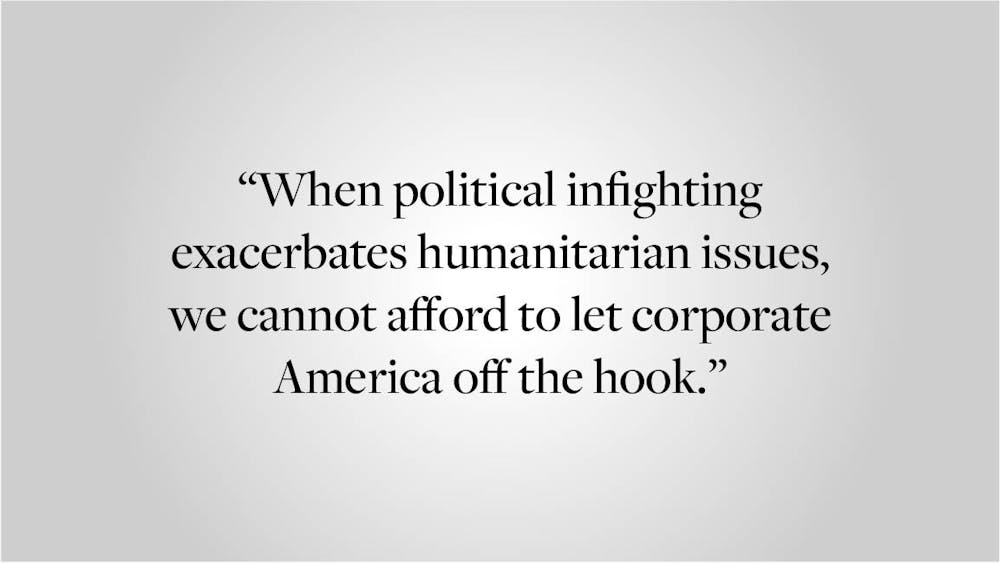Turning on CNN and then visiting Fox News might be the best way to see how polarized American politics have become. News anchors report on the same national issues, yet their presentation of these events are often diametrically opposed. Polarization has hijacked our politics, making legislative response to contemporary issues slow, ineffective and challenging. Leveraging corporate America’s resources may just be the key to addressing our nation’s most pressing social problems. Influential leaders of private industries can participate in our country’s political discourse free of the arbitrary divides plaguing American politics. And our generation must mobilize them to act.
We can already see what corporate engagement in politics might look like. Companies pulling out of Russia after the country invaded Ukraine, publicly distancing themselves from Trump’s presidency or helping employees access reproductive health care after the reversal of Roe v. Wade are all signs of how politics can prompt corporate action. Yet, as consumers, we can demand even more, and with our purchasing “vote,” we should expect to see impact.
Even on polarized issues, companies have shown the ability to take meaningful action. Amid growing popular pressure in favor of controls on firearm sales, the International Organization of Standardization, a body which oversees standards in transactions, approved a merchant code proposed by the Amalgamated Bank to give credit cards the power to flag suspicious large gun sales. All credit card purchases are grouped under a merchant code depending on the industry; different types of vendors have their own unique codes. Before the ISO’s new rule, gun shops were categorized as “general merchandise.” However, they now have their own distinguishable code, giving credit card companies the power to flag any abnormally large firearm purchase. Gun control advocates have celebrated major credit card companies’ adoption of the new code, arguing this marks a step in the right direction.
Some might criticize these credit card companies for adopting a code that favors one side of a political debate, but this political assertiveness is undeniably powerful. It should inspire major actors in other industries to break barriers and leap into the political arena themselves. Historically, gaining bipartisan support for gun control legislation has been challenging, and as we wait for unity over our country’s need for firearm regulation, corporations can fill that void. When political infighting exacerbates humanitarian issues, we cannot afford to let corporate America off the hook.
As corporate consciousness increases, some executives are even starting to hold themselves accountable. The founder of Patagonia, Yvon Chouinard, and his family recently transferred complete ownership of the $3 billion company so that its profits support the fight against climate change. Patagonia is now owned by Holdfast Collective, a nonprofit organization that will ensure that Patagonia’s earnings are used exclusively to advance green initiatives and maintain undeveloped areas around the world. In contrast with the many successful entrepreneurs who have taken their companies public and kept the profits for themselves, Chouinard and his family will have to pay $17.5 million in taxes just for their donation to the trust. His inspiring executive decision shows how, in the hands of conscious and socially responsible leaders, it is possible for capitalism to be a powerful tool to confront our world’s problems.
As savvy consumers, we have the power to mobilize this kind of conscious change. Living in a capitalist economy means consumers are important decision-makers in corporate success. For example, as America continues to become more racially and ethnically diverse, a changing consumer base demands inclusive advertising methods. Companies have to appeal to American consumers who value inclusivity to still be viable. They have shifted because consumer America has shifted. Industries must listen to their consumers given that our approval and support are required for their success. Therefore, leveraging our consumer power is critical in mobilizing leaders toward action.
Chouinard and the new credit card code both reveal the power that corporate America can have in confronting our country’s social injustices. Corporations can continue to come out and say they “support issues” or “will commit to making changes” but in our problem-ridden world, these vague statements won’t make up for the faults of ineffective government. It is up to us to exert monetary pressure if we want change.
Our generation represents a new wave of steadfast scrutiny of political and corporate leaders alike. Companies feel the pressure, which explains why some already dip their feet into the political sphere. So long as we hold tight to our values and use our wallets as political instruments, perhaps we can recruit corporate America as our trusted partner.
Yael Wellisch ’26 can be reached at yael_wellisch@brown.edu. Please send responses to this opinion to letters@browndailyherald.com and other op-eds to opinions@browndailyherald.com.
Yael is the senior editor of opinions of The Herald's 135th editorial board. She previously served as an opinions editor and a member of the Editorial Page Board. She is from Washington, D.C. and studies history and international and public affairs.





